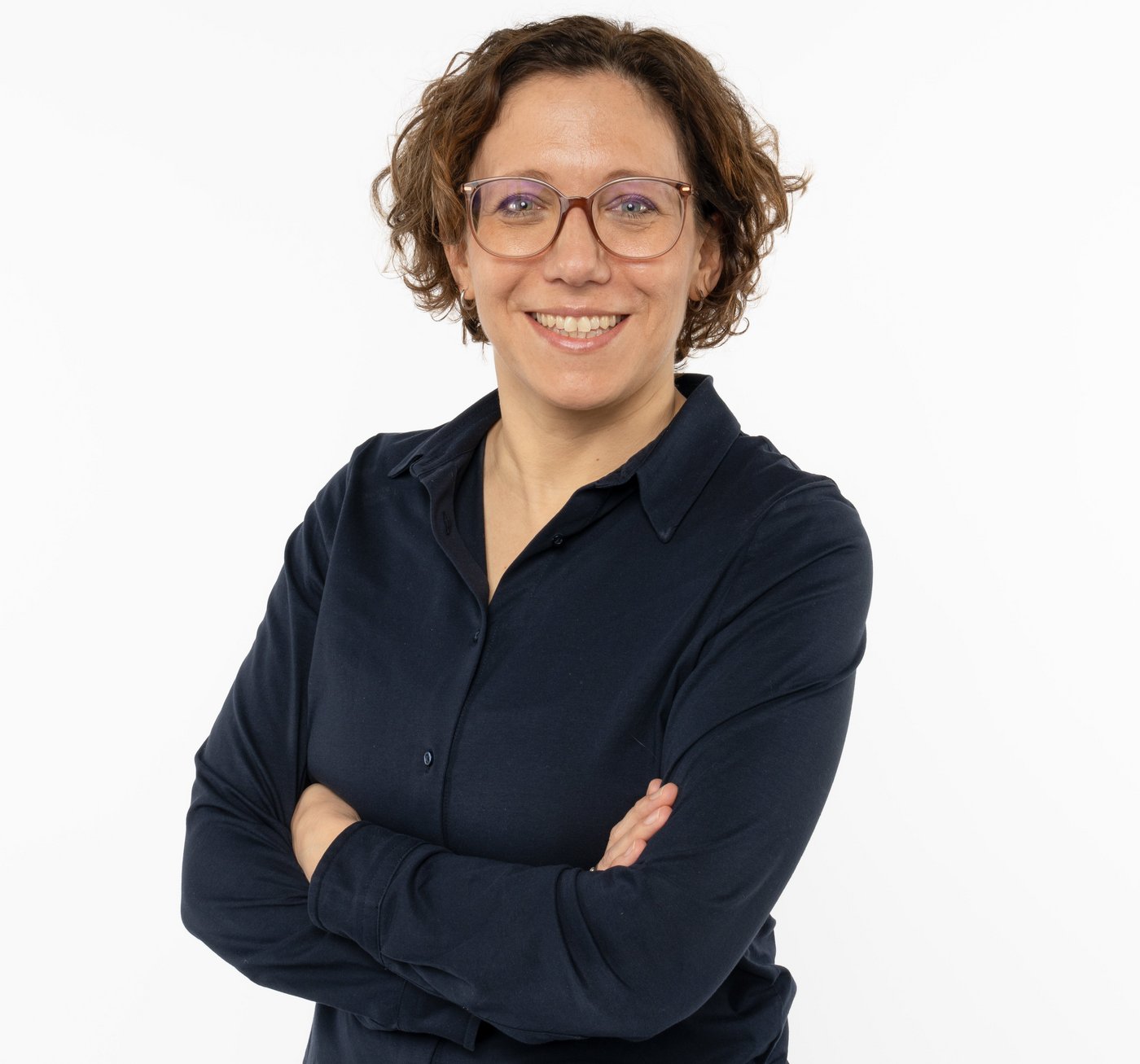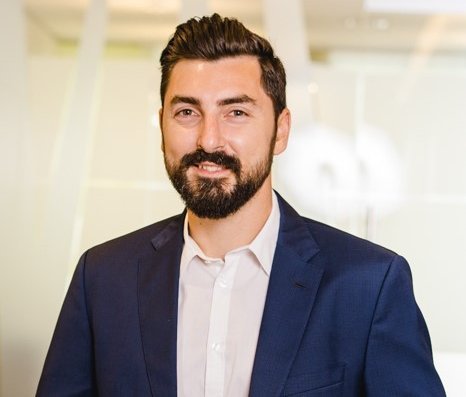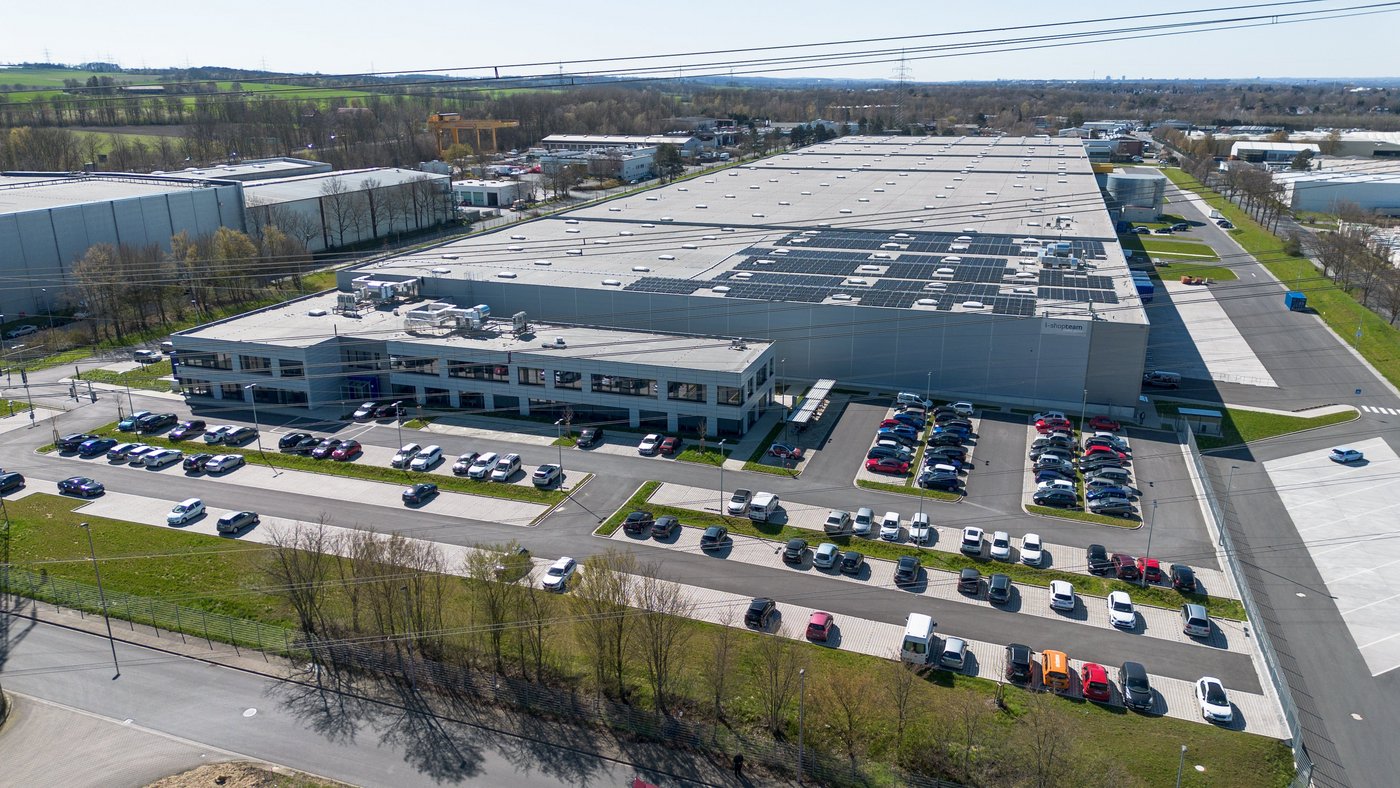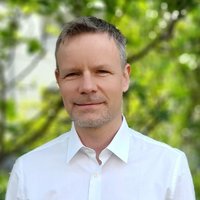L-SHOP-TEAM from Unna is being supported by a consultancy on its path to sustainability. Managing Director Kristin Rademacher and consultant Stefan Dimitrov talk about the many factors involved in the transformation - and their wishes for future financing partners. Textile wholesaler L-SHOP-TEAM on the transformation: “The challenge is not to be deterred”

Ms. Rademacher, why is your company actually called L-SHOP-TEAM?
Kristin Rademacher: Many people ask us that. The “L” can stand for solutions. L-SHOP-TEAM always thinks along with its customers and has solutions ready for them. Solutions start with L. The company name now stands for itself and everyone in the industry knows it.
Today, L-SHOP-TEAM is one of the largest textile wholesalers in Europe. Please briefly describe the business model.
Rademacher: We operate a 55,000 square meter central warehouse in Unna and aim to “never be out of stock”, i.e. always be able to deliver. Our customers are textile resellers such as print shops or embroidery companies in many European countries. You can order all kinds of textiles from us: from T-shirts and hoodies, shirts and blouses to bags, corporate wear and medical scrubs. We also have children's and sportswear in our range and our customers can equip festivals and clubs with us.
The topic of sustainability takes up a lot of space on your website. How and when did the sustainable transformation begin for L-SHOP-TEAM?
Rademacher: L-SHOP-TEAM has done a lot right from the start. For example, we have been working with AWO Dortmund from the very beginning and integrate people with disabilities and disadvantaged people into our company. We have also always been a company that trains apprentices and have paid great attention to using resources sparingly. For the past three years, we have been driving forward our transformation in a structured way under the ESG (Environmental, Social, Governance) system - i.e. environmental, social and corporate governance.

You are supported by a management consultancy. How did that come about?
Stefan Dimitrov: We've been on board for about a year to provide support. Ms. Rademacher and her team had already been working on a number of topics independently, such as the first steps towards climate accounting. We came together over the topic of CSRD.
So in 2024, when you approached the consultancy, L-SHOP-TEAM would have been subject to CSRD?
Dimitrov: L-SHOP-TEAM would have been obliged to report in accordance with the CSRD due to the size of the company. But regardless of that, the way I got to know the company, sustainability is part of its DNA. There are many projects that have been launched over the past few years that are independent of regulatory pressure.
So L-SHOP-TEAM is part of the so-called second wave, which was granted a two-year reprieve through the omnibus procedure?
Dimitrov: Yes, that's right, on April 16, 2025, the EU Directive 2025/794 on the so-called “stop-the-clock” regulation was published in the EU Official Journal, so that large unlisted companies (“wave 2”) do not have to report on the 2027 fiscal year until 2028.
What challenges did - and do - L-SHOP-TEAM face in terms of sustainability?
Rademacher: First of all, the challenge is not to be unsettled by all the big-sounding topics. The megatopic of CSRD can also paralyze smaller companies to a certain extent. That's why we've broken it down into small areas for ourselves. And are now working through them one by one.
Have you set your own targets - for example, to reduce direct greenhouse gas emissions (Scope 1) by 2030 or 2035?
Rademacher: No, we have not yet set ourselves any quantitative targets. However, we are continuously working on improvements. For example, we have already been able to implement one or two tips from the energy audit in accordance with DIN EN 16247-1, which we carried out for the first time at our new location in spring 2024.
What are the biggest levers: is it logistics, energy, procurement?
Rademacher: Let's take energy: we are lucky to have moved into a new building that was built to modern standards. That's why we have little potential for savings. For example, we rent the PV system directly from our landlord. You are supported by a management consultancy. How did that come about?
And cover your entire electricity requirements?
Rademacher: On sunny days, we can cover all the electricity we need during the day from the PV system.
Logistics is a key issue for a wholesaler. How do you position yourself sustainably here?
Rademacher: Our core competence lies in picking customer orders quickly and handing the parcels over to our shipping service providers on the same day as the order wherever possible. In order to become more economical and efficient, we recently invested in a new carton sealer: This machine determines the filling height of a carton and folds, creases and closes it at the point at which it is reached. The carton therefore adapts to its contents and is only as big as it needs to be. As a result, we no longer need any filling material and do not send any air. This enables us to achieve better container fill levels with our service providers and also lower shipping prices - and of course this also reduces CO2 emissions.
This is associated with higher prices. How do you manage that?
Rademacher: With us, the customer has a choice everywhere - except when it comes to sustainability. We have decided to rely entirely on compensated shipping. That's why we cover the costs.

Have you been dependent on financing partners for investments in the sustainable transformation so far?
Rademacher: Not so far. Mainly because we are proceeding in small steps and have only undertaken what is feasible. It would be cost-intensive if we had to build up our own resources, such as a sustainability department. At the moment, we are still trying to get by with the existing staffing levels. But consulting also costs something, of course.
Why do you need them at all?
Rademacher: For me, I often compare it to a personal trainer: a consultation helps you to overcome your inner bastard and really dedicate yourself to certain topics. Transformation is exhausting and sometimes hurts a little. But in the end, you are very satisfied that you received the advice because you grow with it.
Dimitrov: I see our advice here as a kind of coaching. We are the L-Shop's sparring partner, assign tasks and validate the results. In this way, we contribute to the knowledge generation of L-SHOP-TEAM and keep an eye on the financial burden. L-SHOP-TEAM does most of the work itself, and that's a good thing: a good consultant becomes superfluous at some point.
What specifically did you help with?
Dimitrov: Specifically, as I said, it was about CSRD: we set up the process together and provided support with the stakeholder analysis and the dual materiality analysis. Both have now been completed. The next step would now be to take care of the data points. We have currently paused this step due to the simplifications and simplifications of the data points proposed by the omnibus. In addition, the decision regarding the employee threshold is still pending. If a decision is made in favor of a reporting obligation for 1,000 employees or more - instead of 250 as previously - the voluntary VSME standard could also be used.
Do you also support the Supply Chain Act, Mr. Dimitrov?
Dimitrov: The German Supply Chain Duty of Care Act (LkSG) is currently a very turbulent topic. The current government wants to abolish it, and the current statutory due diligence obligations are not to be sanctioned until a new law comes into force - with the exception of massive human rights violations. To this end, the EU Commission is planning to gut the EU supply chain law (CSDDD). At the DDP GROUP and DDP Consulting, we support our audit clients and consulting clients at the interface between CSRD and LkSG/CSDDD and are available as a sparring partner.
Let's take a closer look: How is L-SHOP-TEAM doing with the ecological transformation - with Scope 1, 2 and 3?
Rademacher: We are still at the very beginning of the analysis. We were already in the starting blocks to have our service provider Climate Partner survey our Scope 1 and 2 emissions - and also to carry out a dry run to prepare for the Scope 3 reporting obligation. But at the moment, as I said, we have pressed the pause button.
Because of the omnibus?
Rademacher: That was the reason. But it also helps us to take things step by step. As a textile wholesaler, we are also affected by the digital product passport: We have to publish data on individual articles. We will now concentrate on this obligation first. However, we want to continue collecting Scope 1 and 2 data afterwards.
Scope 1 and 2 often only account for 10 to 20 % of emissions. The rest is supply chain. What do you do in Scope 3?
Dimitrov: That's right: The supply chain is crucial for L-SHOP-TEAM's business model, as the company does not produce the items itself. Scope 3 offers the greatest scope for improvement, but also the greatest effort because you don't have everything under control. Ms. Rademacher and her team have already done a lot of work in this area and carried out a very detailed supply chain analysis. They took a close look, for example: Where do the items come from? Where are they produced? And published all available seals of origin on the website.
Rademacher: The background for us was also the Supply Chain Duty of Care Act. Some of our own customers are not so large that they fall under this directive. But they often supply large partners, and they need specific information on the supply chain. That's why we work closely with suppliers and prepare all the information in advance. If you only start when a customer asks, you won't be able to speak quickly enough.
In the automotive industry, many OEMs got together and jointly formulated a supply chain sheet that went out to all suppliers. Is there something similar in the textile industry? Or do you have to answer different questions depending on the request?
Rademacher: We are represented by L-SHOP-TEAM in many European countries. All of these countries have their own way of thinking when it comes to the supply chain, which is why we receive a wide range of inquiries. Our customers are also often very small and rather shirt-sleeved themselves. We also sometimes receive confusing inquiries, where we realize that the person asking the question doesn't know themselves: The person asking the question doesn't know exactly what information their customer is asking for.
Would greater standardization make sense here?
Rademacher: Above all, it's a question of knowledge building: If I know little and can't categorize topics, I don't know what to ask. That's why a new standard wouldn't help here, but rather more education.
The circular economy is an important topic in the textile industry. As a wholesaler, do you actually take back textiles?
Rademacher: No, we don't have a collection point. It has to be said that the entire industry is still in its infancy when it comes to the circular economy. For example, we need to take a look: Which textiles can be recycled at all? Recycling is only possible to a very limited extent, especially with finished mixed fabrics. We have some brands in our range that produce textiles from offcuts. Others develop their products from the outset in such a way that they can do without mixed fabrics as far as possible. Actually, recyclability starts with product development and design. Then you can also talk about sensible take-back systems.
Dimitrov: Returned goods are rare anyway, because L-SHOP-TEAM does not deliver to retailers. Saleable, flawless returns are put back into storage and go back on sale. However, if there are returns because items are slightly faulty or dirty, the idea is not to dispose of them but to pass them on to employees at very low prices. This is a specific project that arose from sustainability considerations.
A question of understanding: your claim is to “never be out of stock” - how does that actually fit in with the idea of a sustainable circular economy? Isn't it necessary to have goods left over?
Rademacher: No, no goods are left over. The items in our range are classic, timeless blank textiles that are made for finishing. They are not subject to any short-term trends. If a brand takes items out of the range, we are notified in good time and we have time to sell them off.
Ms. Rademacher, even though the L-Shop has not yet needed any financing partners: If you could wish for something in terms of transformation financing - what would it be?
Rademacher: That there are also incentives from the financing side for companies that want to make a difference. Then other companies will also realize why it makes sense to decipher the key points in the first place - and to invest.
Dimitrov: I would like to see more uniformity. Many banks are currently developing green financing options. Companies like L-SHOP-TEAM receive survey catalogs in the form of Excel sheets, in which topics related to sustainability are called up. With our customers, we have noticed that these surveys vary greatly depending on the bank. Sometimes it's about specific data points, sometimes about a global strategy, sometimes it's just yes/no questions. With the CSRD, we were hoping for a new standard that would make such surveys unnecessary in future. Now this new standard could become the VSME - at least I hope so.
About the Company
L-SHOP-TEAM from Unna is Germany's largest textile wholesaler for promotion, leisure and work. The company was founded in 1980 as a print shop specializing in advertising materials. Today, it is purely a wholesaler and supplies textiles, accessories and finishing materials for the European B2B market. The second generation of the family business is run by twin sisters Kristin Rademacher and Andrea Herrmann, as well as the salaried managing director and long-time employee Stefan Schenk.
